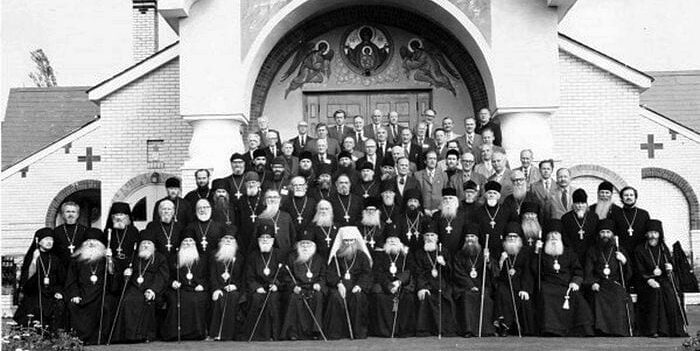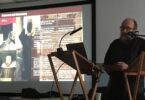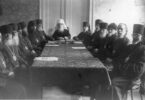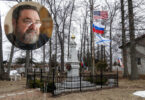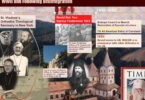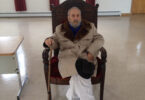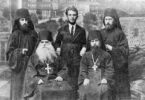Editor’s note
The present correspondence between the first hierarchs of the Russian Church Abroad and the Orthodox Church in America had as its starting point A. I. Solzhenitsyn’s expulsion from the USSR on March 29, 1974. Having known Fr. Alexander from his religious program on Radio Liberty Alexander Isaevich wrote to him already in April, and their encounter in Zurich took place at the end of May of the same 1974. This resulted in the appearance of A. I. Solzhenitsyn’s Letter to the Third All-Diaspora Council of ROCOR, which took place from September 8 through 19, 1974 at Holy Trinity Monastery in Jordanville, and of the reply to this letter by ROCOR First Hierarch Metropolitan Filaret. The following address to the American Metropolia appeared as a result of these words by Solzhenitsyn in his letters to the Council: “And if structural unity is impossible in short order, as I understand it, it is possible to make the call to cast aside the mutual hostility between the Churches by a single nod, by a single proclamation from your Council, and to declare the liturgical concelebration of Orthodox priests to be unconstrained if their Churches are known to be not in the service of godlessness.” Just as the correspondence between the ROCOR First Hierarch Metropolitan Anastasii and the First Hierarch of the Paris Exarchate Metropolitan Vladimir in 1946 and 1947 did not bring about jurisdictional unification, the present correspondence did not bring about practical results. It is valuable, however, in that it expressed two approaches to the position of the Church in Russia. The ROCOR refused to recognize the Tomos of Autocephaly which the Moscow Patriarchate granted the North American Metropolia on April 10, 1970, having expressed at its 1971 Council the viewpoint that it was not the Moscow Patriarchate but the Catacomb Church that was the mother church for the ROCOR. Metropolitan Filaret developed this same idea in his letters, and the First Hierarch of the Orthodox Church in America, Metropolitan Irinei (Bekish), who, after being evacuated from Poland, had served as a “white” priest in the ROCOR diocese in Germany from 1944 to 1947, sent his reply. Archbishop Irinei was chosen to be Metropolitan for the North American Metropolia in 1965, the same year that Metropolitan Filaret was chosen for ROCOR. In his report to the ROCOR Bishops’ Council held from May 23 to June 5, 1967, Metropolitan Filaret reported about two meetings with Metropolitan Irinei at the apartment of ROCOR benefactor Count S. S. Belosel’skii-Belozerskii, which resulted in a mutual understanding regarding the issue of the reception of clergy without letters of release and attitudes toward the Moscow Patriarchate and ecumenism. The present correspondence is a return to an effort toward dialogue. While Metropolitan Filaret wrote his own letters, Metropolitan Irenei’s were written by Fr. Alexander Schmemann. They were published in New York’s Novoe Russkoe Slovo [New Russian Word] San Francisco’s Russkaia Zhizh’ [Russian Life] in 1975. Ten years earlier then the newly-elected Metropolitan Philaret wrote to the editor-in-chief of Russkaia Zhizn’, Ariadna Ivanovna Delianich: “Of course, our Church Abroad cannot be the true Church at the same time as the so-called American Metropolis – especially after the latter did not recognize Fr. John of Kronstadt among the saints. The Church is a single spiritual organism. Such a manifestation is inconceivable in her that one part of the Church recognizes that the other does not recognize. This is understandable even to a child. Therefore, if one of these churches is the True Church, then the other is not.” However, it is very doubtful that Metropolitan Filaret drew practical conclusions from his rigid ecclesiology. Otherwise, questions arise. Was he in the true Church after the war, in Harbin in the bosom of the Moscow Patriarchate? In what status did his father, Bishop Dmitrii (Voznesenskii), pass away? (Bishop Dmitrii died in the USSR as a bishop of Moscow Patriarchate in 1947.) It is also evident from this correspondence that Metropolitan Philaret recognized the priesthoodof Metropolitan Irenei.
Deacon Andrei Psarev,
August 2020
1
The message of the Third All-Diaspora Council of the Russian Orthodox Church Outside Russia to the American Metropolia
“By this all will know that you are My disciples, if you have love for one another.”
We, members of the Third All-Diaspora Council of the Russian Orthodox Church Outside Russia, with our First Hierarch, the Most Reverend Metropolitan Filaret at its head and with the entire Council of the prelates of the free portion of the Russian Church, turn to you, the children and grandchildren of those who, like us, came from the bosom of our Mother, the Church of Russia. All of us have been affected by the same trouble, although in different ways – the toppling of the Russian state, which took place under the blows of godlessness, and the loss of the sense of brotherhood. This trouble, this triumph of darkness has not only dispersed us throughout foreign lands, it has separated us and even embittered us against each other.
But nothing is eternal in this world. We have come to a time when what seemed to be invincible to many started changing. “By the height of the thirties,” writes A. I. Solzhenitsyn, “it already seemed that not only church services with bell-ringing were banished forever, but clandestine prayer was completely stifled” (Solzhenitsyn’s letter to the Council). But now we see something different. There are multitudes of symptoms and truly shaking testimonies witnessing to our peoples’ spiritual rebirth, reassuring us with the Prophet’s words: “Morning comes, but also the night.” (Is. 21:12) Is it not time, in this predawn hour of God’s forgiveness and mercy to awaken from the sleep of our destructive divisions and lack of brotherhood? Is it not time for us to remember that all of us are children of the Russian Church, and, even if we did not come out of it ourselves, we did so in the person of our fathers, grandfathers and great grandfathers, we came out of the “land of our fathers.”
Do not hurry to say, “They apparently forgot to whom they are writing, for we are Americans and their Russian problems do not concern us!” Do not hurry because, first of all, the land of the fathers and the Russian Church have not become empty phrases for all of us. Secondly, even those who unreservedly regard everything having to do with Russia nothing more than their ethnic past can, since they are Christians, be faced each minute with Our Heavenly Father’s question, “Where is thy brother?” No self-justification will save us, nor those who in their separation equally cry out, “Our Father!” And we will not have any recourse from the fatherly Gospel admonition, “It was right that we should make merry and be glad, for your brother. . .” (Lk. 15:32).
Do not suppose that we are in the grip of abstraction and are living in the clouds, forgetting reality. No, we remember it and, first of all, we ourselves repent that we probably think of you no less than you do of us: “Can anything good come out of Nazareth?” (Jn. 1:46). We are convinced that the existing division is a great misfortune allowed by God for our sins.
This does not lead us in any way to simplify the different opinions that divide us, reducing the church conflict to a simple dispute. No, we are more than perplexed by many of your actions and, expressing the words of the one who has been called “Russia’s conscience” in our native land, we ask ourselves, “How is it, that out of sympathy to captives, instead of knocking down their chains, they put similar ones on themselves? Out of sympathy for slaves they put their neck under the yoke.”
If you would say that these words do not apply to you at all we would be obliged to ask you, “So what was happening in Russia before Archpriest A. Schmemann’s article in the press of September 27, 1973? What was happening before he called Patriarch Pimen’s statement in Geneva ‘a pitiful lie which no one in the world believes any more’”?”
But was it not known to you before September 1973 that, beginning with Patriarch, all, both good and evil, are in slavish dependence? That any church act, including the nomination of a patriarch acceptable to the atheists, as well as the granting of autocephaly, is totally dependent upon the atheistic authorities? That “to support, out of sympathy to those who utter lies in captivity, the same lies in freedom” (A. Solzhenitsyn) is grave thoughtlessness, bringing devilish deception into the frequently naïve western world? It is not upon the acts of Patriarch Sergii and his followers that subsequent church life can be built, for “it is not their darkened calculations, but God’s Providence” (A. Solzhenitsyn) that builds it.
But by no means do we wish polemics. We are searching for peace and are praying for it. It is necessary for you and us, who find ourselves in the free world, to build church life in unanimity and agreement, as it had been earlier from 1936 to 1946.
But believe us, we do not consider us to be infallible at all and we beg forgiveness from our hearts of anyone whom we have unwittingly offended. But we will stand till our dying breath as the Russian Orthodox Church, as its only free segment, preserving everything holy and true that it had and that it commands its sons to preserve. But along with this, we wish to call upon ourselves and you to pray for the strength to wish for an exit from the inveterate sin of division through the power of Him “who loved us and gave Himself for us,” and for us, who call and regard ourselves as right-thinking, to take the path of those who are right-acting in God’s eyes
The major writer and Russian patriot of great courage, A. I. Solzhenitsyn, gave this wise advice when speaking with one of our priests: “If we look only at the past that divides us, we will always be bound by the logic of arguments. But it suffices to place our attention on the actuality of the future, and much will become more pliant, and some of it might completely fall away.”
We extend our brotherly hand to begin the search for ways to change our sinful church division. Whatever success we may have in this, whether it be in helping the captive Russian Church, or in achieving total unification – anything will be better than our current situation. May Our Lord, our One Leader of Pastors and the Most Holy Theotokos help us to be Orthodox in our actions: “Abhor what is evil. Cling to what is good.”
Council Chairman Metropolitan Filaret,
September 1974
2
To His Eminence Metropolitan Filaret and His Flock
“Love suffers long and is kind; love does not envy, love does not parade itself, is not puffed up; does not behave rudely, does not seek its own, is not provoked, thinks no evil; does not rejoice in iniquity, but rejoices in the truth.” (1 Cor. 13:4-7)
“Anything will be better than our current situation.” We wish to begin our response with these concluding words of your message. For we heard in it, with joy and gratitude to God, a desire to take the path of overcoming those divisions which have poisoned church life long ago and which bring terrible and sinful temptations into the souls of believers. As difficult as this path may be, we believe that with the help of God’s grace, which “always heals the infirm and fills what is lacking,” it is possible, and we are ready on our part to do everything that depends on us to restore the unity of faith and love between us which is the content of the joyful essence of Christ’s Church.
However, this holy initiative requires, first of all, us to be totally truthful and sincere with each other. Differences of opinion, be they even deep, in the understanding and assessments of the Church’s paths, are one thing, especially in the midst of those infinitely difficult circumstances in which we are fated to live. But that simple, factual truth, which does not depend on any interpretation and whose acknowledgment is our primary duty toward each other. We are mentioning this because we were bitterly saddened by the assertion in your message that we “put our neck under the yoke “and started “to support, out of sympathy to those who utter lies in captivity, the same lies in freedom.” Why, you cannot be ignorant of the fact that in our Church, both before and after it received its autocephaly the voice of witnessing to the persecution of faith and the Church in Russia was never silenced, the matter of helping the persecuted was never stopped, and interaction with the living forces of the suffering Russian Church was never weakened. You cannot be ignorant of this, since it suffices to familiarize oneself with the rulings of our Councils, both the Hierarchical and All-American ones, leaf through our official organ, and listen to the radio broadcasts and read the press releases, etc. of preachers, theologians, and representatives. How and when have we realistically sinned by silence and inactivity, betrayed our freedom, or entered into any kinds of bargains with our conscience?
We address this question to you not for polemics, because it is in a renunciation of any factual untruth, of unfounded accusations and insinuations, that we see the primary and necessary condition for that overcoming of divisions that you are calling for and which we desire wholeheartedly as well. For if there is just a bit of truth in those accusations which have so often, over these past years, been made against us openly and officially, what would there be for us to talk about, in what would we unite? It stands to reason that we also address this demand for truthfulness to ourselves. If there was an untruth in our statements about you, point it out and we will correct it publicly right away. So, let us cleanse ourselves and our conscience of all untruth, which has grown up upon our divisions as an inevitable rotted fruit and approach the holy work of healing the church body that has been wounded by enmity.
We cannot, alas, agree as well with that section of your message in which you paint us as people whom, because they have become Americans, “Russian problems do not concern.” Yes, we are not a segment of the Russian Church. More than that, in our canonical independence as the Orthodox Church in America, in its freedom from whatever dependence on “overseas” Churches, and in its acquisition of a permanent canonical basis we see the crowning of the almost two-hundred-year-old mission here of precisely the Russian Church and the fulfillment of what the ever-memorable Patriarch Tikhon, Archbishop of North America at the time, called for back at the dawn of this century. Yes, we see in the existence of over ten national “jurisdictions” a sinful bringing down of the universal Truth of Orthodoxy to the level of a tribal religion, and we are certain that however lengthy and agonizing the process of overcoming this tragedy may be, only the realization here of a single local and independent Church is in keeping with the Orthodox Faith, Orthodox teaching on the Church, and the entire Orthodox Tradition. Yes, we take the constant growth of the number of American born among our episcopate, clergy, and laity as a gift of God, as a testimony to the power and truth of Orthodoxy. But is there any kind of contradiction between the abovementioned interest and interest in “Russian problems”? Is it necessary to be a formal segment of the Russian Church in order to sympathize with it? Is the Russian Church not itself, first of all, a part of the single, holy, and apostolic Church, living by the same commandment of love, according to which if one member suffers all the others suffer along with him, and if one rejoices everyone rejoices along with him? And, finally, what problems are we talking about? If these are political issues, they have no place in the Church. And if, as we are convinced, the “problems” of the Russian Church today are problems of Christian conscience and truth, they are not limited by “flesh and blood” but stand before the conscience of each Christian. And thus all of us, whether we are connected to Russia by blood or do not have this connection consider it our duty and calling to engage in that struggle between the light and the darkness of godlessness, upon which, as we know, defends the future of the entire humanity.
We are convinced that Christ’s Church can build itself anywhere and at no time neither against anything earthly, temporary, or transient nor for it, since its basis is solely in eternal and unchangeable faith, handed down to us in its teachings, in church structure, and in the unceasing primacy of a life of grace. We are convinced that its true victory over this adulterous and sinful world takes place not along the paths of separation from universal unity, not in the rupture of relationships, and not in the juxtaposition of what we regard as pure and free to what is supposedly fallen and polluted, but in the constant endeavor of self-purification, love, and brotherly help for each other. For always, at all times, “God’s strength was made perfect in weakness,” holiness and the grace of God’s gift have always and everywhere been given by unworthy hands, and the Church has always and everywhere been strong and holy in its struggles and exhaustion only through God’s grace, which overcomes all things.
We deemed it our duty to tell you all this, but not for polemics and not in the spirit of admonition, but in order to avoid leading both you and us into error. But, having said all this, we repeat what we have started with – that we accept with joy and love your call to seek jointly paths of overcoming this pernicious division. And we are certain that the true beginning of this path should be unity in prayer, above all in the holiest sacrament of the Eucharist. In it, Christ’s love, which alone is able to overcome everything that divides us, will pour out into our hearts, and in it what is impossible for man will become possible for God. It is to that beginning, to unity in Christ, that we are calling you, firmly believing that the Lord Himself will bring about our unity.
Metropolitan Irinei, October 31, 1974, New York
3
The Decision of the Bishops’ Council of the Russian Orthodox Church Outside Russia Dated November 6/19, 1974
Heard: Metropolitan Irinei’s message to “His Eminence Metropolitan Filaret and His Flock” dated October 31, 1974
Resolved:
1. Metropolitan Irinei’s message correctly points out that statements against Communism and the persecution of the Church in the USSR have come out of the ranks of his Church a number of times. These statements deserve praise. The Council did not forget this when it received the text of the message to Metropolitan Irinei and his flock. However, since our thoughts were then focused on the past, before turning to the present we regretfully recalled that the separation from the Russian Orthodox Church Outside Russia at the Cleveland Council took place on behalf of the union between the Metropolia and Moscow, which did not take place at the time. On the other hand, the reception of autocephaly from Moscow presupposed that the Moscow Patriarchate is the legitimate head of the Russian Church, which the Church Abroad cannot accept under any circumstances. This was taken as an acknowledgment that the Patriarchate was supposedly able to act freely in performing such an important action, relying only upon considerations of benefit to the Church. But any support of this Soviet deception, making the Church a weapon of foreign Communist politics, is a great temptation. It leads into error those in the West who do not know the actual origin and working situation of the Moscow Patriarchate with respect to the atheistic regime. It appeared to the Council that the acceptance of the autocephaly from the Moscow Patriarchate, therefore, was a testimony to the world of its supposed positive quality and freedom, morally binding those who receive it. In this sense, it serves to a certain degree as that yoke which is mentioned in the Council’s message. The same sense is given to the exchange visits between the Patriarchate and the Church in America, such as the journey of the delegation from St. Tikhon Seminary to the USSR last year, headed by Fr. V. Borichevsky, and so on. The Bishops’ Synod would have preferred to avoid mentioning such facts at the present time, but this is provoked by the rebukes in Metropolitan Irinei’s message.
2. The Bishops’ Synod notes with satisfaction Metropolitan Irinei’s statement regarding his and his flock’s sympathy for the suffering Russian Church. Any statement in defense of the suffering Russian Church has to be appreciated. However, the Bishops’ Council supposes that those who have separated themselves and no longer belong to this suffering body cannot have the same experience as those who feel that they belong to this body. For the separated the problems of the Russian Church are no longer their own problems but are someone else’s problems, even of someone who is close and beloved. With the background of the world’s lack of understanding of the Russian Church’s sufferings or indifference toward them, which, alas, is encountered even among Orthodox Churches, Metropolitan Irinei’s declaration on behalf of the Church he heads expressing compassion toward it and his protests against the persecutions should be met with love and gratitude. And, of course, he points out correctly that today the problems of the Russian Church are not of a political nature, but are problems of the struggle of darkness against light. Unfortunately, the Moscow Patriarchate is trying in principle to unite these incongruous areas of Christ and Belial. Thus it often descends into the area of purely pro-communist politics. The Church should illumine all aspects of life, since they are not irrelevant to the makeup of an Orthodox soul. However, when it condemns the evil of Communism, the Russian Orthodox Church Outside Russia rests not upon political problems, but upon spiritual ones, “For we do not wrestle against flesh and blood but against principalities, against powers, against the rulers of the darkness of this age, against the spiritual hosts of wickedness in the heavenly places” (Eph. 6:12). Our Church assesses political events from the viewpoint of their belonging to either side of this wrestling indicated by the Holy Apostle.
3. Spiritual unity in prayers and sacraments marks the achievement of likeminded confession, which is brought about not only by love for each other but by love for truth as well. The Bishops’ Synod would suppose meetings between the two sides to be fruitful for the advance exchange of opinions and for the determination in this way whether unification or cooperation between them is possible, and to what degree. The Bishops’ Synod supposes that if its views expressed in this decision regarding the essence of the struggle that is being led in the world and the Moscow Patriarchate’s participation in it are shared by Metropolitan Irinei and his coworkers, then perhaps a principled basis for starting discussions between our representatives might be found.
November 12/25, 1971, New York, original signatures. Certified true copy with the appropriate signatures: Bishop Lavr, Secretary of the Bishops’ Council
4
To His Eminence, the Most Reverend Metropolitan Filaret
Your Eminence,
On behalf of my brother hierarchs and on my own behalf I must inform you in total sincerity that your Synod’s decision of November 19, 1974, sent to us in response to our message of October 31, deeply saddened us.
It saddened us first of all because it does not convey any real and unconditional desire to overcome what we regard as most important in our divisions, which is the absence of Eucharistic communion between us. Instead, you again bring up accusations against us which were refuted long ago in word and in deed.
In your decision, you submit church unity to our acceptance of your views “regarding the essence of the struggle that is being led in the world and on the Moscow Patriarchate’s participation in it,” your approach to the Russian Church, your assessment of our autocephaly, and your understanding of the past and present. However, the matter is that in these issues there are deep and basic differences of opinion between us, which we, of course, cannot resolve right away. Besides, we must frankly say that we are troubled most of all not by this divergence with you regarding views and assessments but by the deeper and more tragic hopelessness of the path you have chosen which led you to break away from the body of the Russian Church back in the days of Patriarch Tikhon and subsequently to break away from the entire Universal Orthodox Church.
Nevertheless, we did not place any conditions in our message to you. We did not place them because we are convinced that, in the first place, our divisions, brought about by the tragic disorder of this era, do not justify the rupture in prayer and sacraments, and, in the second place that it is precisely in the unity and the sacraments that unite us with Christ and in Him – with each other that we see the only way to mutual understanding and reconciliation. For where can we seek spiritual help, the enlightenment of our hearts and minds if not from the Lord, without whom “we can do nothing.”?
Both Church history and Orthodox Tradition convince us that this path is the right one. There were always disagreements, disputes, and searches in the Church. At the beginning of this century a whole assortment of Russian hierarchs and theologians, headed by Metropolitan Antonii (Khrapovitskii) was rebuking the synodal structure as uncanonical and the transformation of the Church into a governmental “department of Orthodox confession” as being harmful and sinful. But none of them considered separating from the Russian Church. They were seeking the Church’s healing and rebirth from the inside. For as long as unity of faith and unity in prayer and sacraments remain unbroken, as long as namely in this unity, given by God, not by people, Church members seek healing for their infirmities and shortcomings, do the victories of God’s grace over all that is human take place without fail. This is why the Church has always regarded the preservation of it unity as its most important matter, and schism as the most pernicious of all sins.
Therefore, we see the horror and sin of divisions abroad between different branches of the Russian Church not in its factional disputes, even in the deep ones, (for, according to the Apostle’s words, “there must always be factions among you”) (1 Cor. 11:19), but in that ease of ruptures, excommunications, and reprimands, which lead to the destruction of any discipline in the Church, force the clergy and laity to transfer from “jurisdiction” to “jurisdiction” for any reason, turn church life into a battle of ideologies and orientations, and lower it to the level of constant disputes, denunciations, and demagogic newspaper polemics. Thank God that our Church is not guilty of issuing such truly sacrilegious reprimands! How many people leave the Church in horror and disgust, since in these decades-long quarrels, prohibitions, and “straining at a gnat” the transcendent holiness of the Church is no longer visible or perceptible to them.
The only way of escaping this is by returning to that basic unity, unity in Christ, which, we believe isn’t broken by all these diverse opinions, to the liberating and revivifying power and joy of mutual prayer as we hand over our divisions to God. Any other path, any other beginning, will be practically a continuation of the old path and will lead only to the greater intensification of our disagreements. Let us live and arrange our church life differently, without imposing on each other the administrative unity that is apparently impossible at the present time. Let us even understand the path and tasks of the Church in America differently. Let us, finally, also understand differently our participation in the struggle for Christ’s truth in the world and in the suffering Russian land. Is all this capable of destroying our unity in Christ, “Whom alone we serve,” even in infirmities, in weaknesses, and in the inevitable human limitations?
We are not proposing anything impossible, no triumphant ostentatious acts, which would require preliminary solution of some kinds of external issues of “protocol.” We are proposing only a refusal to ban the attendance of each other’s churches and to pray and receive the Holy Sacraments together. And if this ban becomes nonexistent, our mutual discussion will begin in a totally new and different spirit.
With brotherly love in Christ, Metropolitan Irinei
5
To His Eminence, the Most Reverend Metropolitan Irinei
Your Eminence,
I have received your letter and it was reported to the Bishops’ Synod
With great sadness, we could not help noticing its intensified polemics. Much could be written to you in response to everything that was said by you. However, the issues you touched upon have already been clarified a number of times for various reasons and we think, however, that your letter is in itself clear testimony as to how poorly prepared is the soil for that unity which is being spoken about.
It is clear that the issue of relations with the Moscow Patriarchate remains one of the main roots of our disagreement, to its feature which A. I. Solzhenitsyn termed “life according to falsehood.” If you would express yourself fully about its path, then perhaps this might ease our mutual relations. Our offer to have prior meetings to determine the possible extent of our rapprochement and cooperation right now still stands. We will leave the rest to the development of mutual peace-loving and to the action of God’s grace, although your letter demonstrates basic disagreements between us regarding other issues as well.
November 18/31. With brotherly love in Christ, Metropolitan Filaret
6
To His Eminence The Most Reverend Metropolitan Filaret
Your Eminence,
Your letter of January 31 demonstrates very clearly that our offer to restore first of all togetherness in prayer and in this way to begin overcoming church divisions is being rejected by you. While rejecting it, however, you lay the responsibility for this upon us. You find “intensified polemics” in my letter and that it “is in itself clear testimony as to how poorly prepared is the soil for that unity.” Moreover, my entire letter is nothing more than a call and offer to begin the matter of rapprochement not with polemics or disputes but with prayer and the acquisition of God’s grace as a help. I will remind you of my words: “Our divisions, brought about by the tragic disorder of this era, do not justify the rupture in prayer and sacraments, and therefore <…> it is precisely in unity and sacraments, which unite us to Christ and with each other in Him, that we see the only path to mutual understanding and reconciliation… <…>The only way of escaping this is by returning to that basic unity, unity in Christ, which, we believe is not broken by all these diverse opinions, to the liberating and revivifying power and joy of mutual prayer as we hand over our divisions to God. Any other path, any other beginning, will be practically a continuation of the old path and will lead only to greater intensification of our disagreements.”
Your Eminence! Do you actually, in your conscience, take these words as full of “intensified polemics”? And if that is so, what will our conversation be about in this atmosphere of suspicion and mistrust? How will we condemn others for “life according to falsehood” if we will not renew ourselves with simple truth and will refuse to take “crooked paths”? And how will we finally arrive at this other than through prayer, coming together in Christ?
In your initial message to us we heard a resolve to take an actually new step, a desire to seek new paths. And we responded with full sincerity and readiness with a twofold proposal to begin with healing the most terrible and tempting wound – the separation of brothers according to faith, spirit, and blood at God’s throne. “Prior determinations” are not needed for this holy matter. On the contrary, only this encounter in Christ in the unity of the Church Universal will make any further steps to be steps along a new path, rather than agonizing stomping in the same dead end.
February 28, 1975, With brotherly love in Christ, Metropolitan Irinei
7
To His Eminence Metropolitan Irinei
Your Eminence!
Our newspaper correspondence has come to a dead-end and there is no sense in continuing it. But I feel that it is necessary to reply to your last letter.
Appealing to my conscience, you quote an excerpt from my previous letter and ask where I see “intensified polemics” in it. I do not see it in this one. But, Your Eminence, you did not quote your entire letter. It contains entirely different ideas and expressions.
As you stubbornly pass over the main issues that divide us you persistently call for togetherness in prayer. What can I say – a renewal of such togetherness would be a great joy. But it is possible to begin with this only if there are disagreements of a personal nature. In this case, the matter is clear and simple, there is peace and we will pray and serve together. But if the differences are a matter of principle, following the Church’s words, “Let us love one another, so that with one mind we may confes,” it is necessary first to achieve that oneness of mind. And only when this is achieved is the joy of such achievement crowned with joint prayer. Think back to the historic conference with the hierarchs Metropolitan Evlogii, Metropolitan Feofil, Metropolitan Anastasii, and Bishop Dimitrii, which took place specifically to discuss issues of church divisions, as in the present case. Then the hierarchs did not begin the conference with concelebration, they concluded it with it.
And generally in Church history concelebration did not take place without oneness of mind. This is a purely ecumenical invention of our days. “Love,” as understood by ecumenical sophistry, opens wide to everyone in the world its “loving embraces,” but these embraces are prepared to choke true Orthodoxy to death, burying it in the pile of unorthodox sophistries. For it is with, good reason that the Apostle of love says that a person who speaks wrongly about the truth should not be welcomed into a house, or even greeted, since the one who greets him participates in his evil deeds.
The main issue dividing us is the issue of the Soviet hierarchy. The Church Abroad will recognize it as the legitimate and valid leadership of the suffering Russian Church only when it with all decisiveness rejects the disgraceful and terrible declaration of Metropolitan Sergii, goes off its pernicious path, and takes the path of church truth, defending it openly and fearlessly. The disgraceful spot must be washed away. And as long as this is absent it remains under the “omophorion” of the atheistic regime, not daring to take a single step without its “blessing,” especially in its dealings abroad. Why, this is clear even to a child!
I will interrupt my letter at this point to quote verbatim what was said regarding this issue by His Eminence Archbishop Andrei of Rockland, who had performed his pastoral ministry in Soviet Russia for a long time and knows well all of the nightmares of Soviet reality. Here is what he said:
Once in a certain market place the merchants managed to obtain several varieties of the best honey. There was white honey, honey, from buckwheat, and from other flowers and plants.
Each had its particular taste and aroma. And when the merchants mixed all of these varieties in a single barrel, the result was an aroma and a taste that was beyond any dreams. People flocked to buy this honey, willing to pay any price. And suddenly Blessed Xenia appeared. “Don’t take it, do not take it,” she cried, “you cannot eat this honey, it has a rotten smell.” “Why, you must be crazy! Get out of our way! See, how much we are getting for this. And how can you prove that this honey cannot be eaten?”… “Here’s how I will prove it!” she cried, fell upon the barrel with her might, and… tipped it over. While the honey poured over the pavement people crowded around the barrel, but when all of the honey had poured out everyone cried out in horror and disgust, for a huge dead rat was at the bottom of the barrel. Even those who had paid a high price for this honey and were taking it in jars, threw them away.
“Why did I recall this incident and why am I mentioning it?” Vladyka Andrei continued. “I’ll be glad to give an answer. Recently a certain American who was interested in Orthodoxy and has visited almost all of the churches in the Soviet Union and here in America asked me why I and a whole group of Orthodox were not taking part in receiving the Patriarchal delegation and in general seem to avoid anything that has to do with church life in the Soviet Union, and turn away from those church groups that are connected with the Patriarchate in one way or another even here in America. What is the problem? Are the teachings, sacraments, and services any different? I gave it a thought and replied that no, that is not the problem. The faith is the same and so are the services. The Orthodox faith is like aromatic honey. But if you pour this honey into a barrel with a dead rat at the bottom, would you want to sample this honey? He looked at me in horror, “Why, of course not!” “So it is the same for us. We steer clear of everything connected with Communism. For us, Communism is the same as the dead rat at the bottom of the barrel. And if you would fill this barrel to the brim with the best aromatic honey – no, we would not want this honey. Honey as such is wonderful, but cadaverous poison and stench made its way into it.” My interlocutor nodded silently. He understood. What about you?
This was so graphic and convincing!
In the conclusion of my letter, I ask Your Eminence in turn if you really, according to your hierarchical conscience, consider KGB workers vested in riasas and klobuks to be true spiritual guides and leaders of the much-suffering Russian Church? Do not you see that the dead rat of Communism lies at the bottom of that quasi-church organization?
Or do you prefer to shut your eyes and plug up your ears, so as not to see or hear, and to brush aside the unattractive reality?
Of course, if that is so, any further discussion regarding unification is superfluous, and there can be no talk of concelebration.
Metropolitan Filaret, February 27/March 12, 1975
8
To His Eminence, Metropolitan Filaret
Your Eminence,
After receiving your letter of March 12 I had decided not to show it even to my fellow brother bishops, since its content appeared so strange to me. I did not think that you would publish it, especially during the first days of Great Lent, when the Church calls us to introspection and repentance. My intention was to reply in a private letter not subject to publication, in which I could share my perplexities. Since, however, you published your letter, my conscience will not permit me – in spite of my extreme reluctance to darken these holy days by painful polemics – to leave without response what I cannot avoid seeing as a grave distortion of your faith itself. This is that image of the dead rat in the barrel with honey with which you clarify your attitude toward the Moscow Patriarchate and from which you deduce that “any further discussion regarding unification is superfluous, and there can be no talk about concelebration.”
Your Eminence! Do you not realize or feel what actually horrible conclusions inevitably arise by themselves from this story, which you find “graphic and convincing.” And if Holy Myrrh instead of honey was in the barrel that was defiled by the dead rat, would Blessed Xenia have poured it on the ground as well? For your comparison leads precisely to this conclusion, and you make it yourself. Whereas faith immemorial and immemorial experience are based on the idea that no matter what sinful hands perform the sacraments (and whose hands, in God’s eyes, are pure and worthy of performing them?), no matter how sinful, impure, and fallen may be the external human “wrapping” of the Church, at the bottom of the barrel believer find the Most-Pure Body and Honorable Blood of Christ. And when an unworthy bishop brings out the chalice with defiled hands, is its holiness, its power, lessened?
It is precisely here that we find the essence of our difference with respect to the long-suffering Russian Church. You look at the hands holding the chalice and are horrified by their impurity. We, I dare to think, along with the overwhelming majority of believers in Russia, behold the chalice and the holy cross, elevated by these hands over the tormented country and it is from them – from their divine light and unconquerable power, and not from the hands holding them, — we anticipate salvation, enlightenment, and rebirth.
And if we are commanded to denounce any lie, no matter out of whose mouth it might emerge, witnessing about the persecuted, and helping the suffering – and we have never stepped away from this denunciation, nor from witnessing – then may God preserve us from merciless and pharisaic judgment, which does not belong to us, for “Vengeance is Mine, I will repay, says, He Lord.”
I write these lines to you with great regret and pain. For your letter puts an end to the hope that had begun to light up in us that the time had come to soften hearts. No, apparently it has not. But my conscience and that of my fellow brother bishops is clear. For it was with full sincerity and without any ulterior motives that we offer you that path of overcoming our division, which you have chosen to compare with “ecumenism” as if we were not brothers according to the same faith, children of the same Church! I want to believe that this is not your last word and that sooner or later we will see the triumph in all of us of that love –- not our love, but Christ’s – which “bears all things, believes all things, hopes all things, endures all things” (1 Cor. 13:7).
Irinei, Archbishop of New York, Metropolitan of All America and Canada

